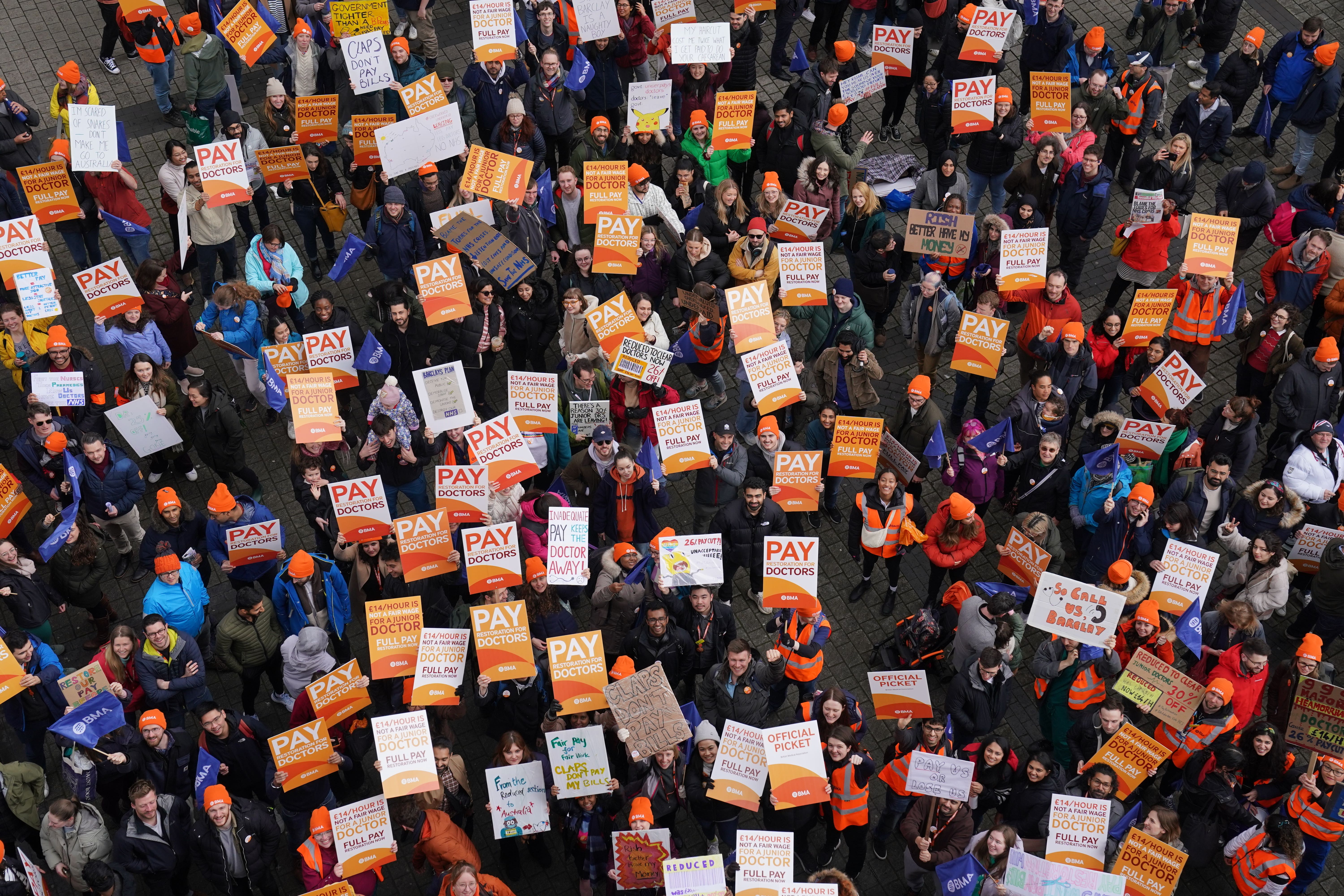Junior doctors challenged over strikes care delay for three-year-old with cancer
An MP and doctor said the strikes were ‘absolutely the wrong thing to be doing’.

Your support helps us to tell the story
From reproductive rights to climate change to Big Tech, The Independent is on the ground when the story is developing. Whether it's investigating the financials of Elon Musk's pro-Trump PAC or producing our latest documentary, 'The A Word', which shines a light on the American women fighting for reproductive rights, we know how important it is to parse out the facts from the messaging.
At such a critical moment in US history, we need reporters on the ground. Your donation allows us to keep sending journalists to speak to both sides of the story.
The Independent is trusted by Americans across the entire political spectrum. And unlike many other quality news outlets, we choose not to lock Americans out of our reporting and analysis with paywalls. We believe quality journalism should be available to everyone, paid for by those who can afford it.
Your support makes all the difference.Junior doctors have been called out about the impact of strikes on the care of a three-year-old cancer patient.
Dr Caroline Johnson, a consultant paediatrician, described the case of Oscar, a three-year-old whose cancer treatment was postponed as a result of the strikes in England after Easter.
The Conservative MP for Sleaford and North Hykeham said that she “could not understand how someone could walk away from a three-year-old with cancer to try and obtain themselves more money”.
She added: “I’m concerned about doctors striking, to me as a doctor myself, it feels like the absolutely wrong thing to be doing.”
Do you really think it is reasonable to potentially lead to the death of a three-year-old boy by in order to get more money for junior doctors?
Dr Johnson told the House of Common’s Health and Social Care Committee that Oscar had been declared free of cancer of the soft tissue, but a recent MRI scan showed that his cancer may have returned.
He was due to have an operation to confirm the diagnosis on April 11 but this was postponed to April 27 because of the strikes.
Addressing the British Medical Association’s (BMA) deputy chairwoman of council, Dr Emma Runswick, the MP said: “We know as medical professionals, and I think the general public know, that if you delay treatment of cancer, it can lead to death.
“Do you really think it is reasonable to potentially lead to the death of a three-year-old boy in order to get more money for junior doctors?”
Dr Runswick replied: “I’m really sorry to Oscar’s family and to all patients who had their appointments operations, postponed, rescheduled, because no doctor really wants to be on strike.
“We’re not striking for no reason – we are balancing the difficulty of knowing that pay erosion is affecting our retention, knowing that pay erosion is affecting doctors’ ability to live and work in this country, and the effect that that has on many patients over a long, long period of time for the next several decades, with the possibility of difficulties and disruption now.
“I would really emphasise that there was no need for this strike action to take place.
“We told the Government all the way back last summer that we were looking to open negotiations and there were no negotiations. And then when we finally got into negotiations after the first round of strike action, they were almost immediately collapsed by completely unreasonable preconditions.
“So when doctors are struggling with the costs of living, the costs of training, cost of student loan debt, cost of other debt because student finance will not fund you through five years, six years of medical school.
“When you have people who are really struggling to afford the childcare that they require to work unsociable rotas, nights, weekends, then we have to take action both to support the ability of our colleagues to live and work and train in this country but also to prevent them leaving for the future.
“Before we had any strike action, any strike action at all from any health professionals, we have 7.2 million people on the waiting list, all of whom are in positions of suffering and struggling and I don’t think that’s acceptable.
“And I think it’s contributed very heavily to by the loss of staff over the past decade or so, and the erosion of conditions of work in the NHS.
“I think that’s possible to reverse. I think it’s reasonable to want to reverse it. It’s a real shame that it’s taken strike action to get Government to the table on this issue but I don’t think it’s unreasonable that we’ve been we’ve taken, having been pushed there.”
Dr Johnson responded: “I don’t know Oscar’s parents but the likelihood is that the junior doctors striking earn more than either of those parents, and certainly more than the average person who’s been asked to suffer for longer as a result of strikes, and as a doctor, I just cannot physically kind of understand how someone could walk away from a three-year-old with cancer to try and obtain themselves more money.”
Meanwhile, Dr Runswick told MPs on the committee the BMA was “cautiously optimistic” about talks aimed at resolving the pay dispute between the Government and junior doctors in England.
She said that recent talks held between ministers and the union were “positive” but warned the progress is “painfully slow”.
Dr Runswick also said she supported the decision for the Campaign Against Antisemitism to refer a former BMA junior doctors’ committee member to the doctors’ regulator following the discovery of posts he made on social media.
She said Dr Martin Whyte was “quickly” suspended from BMA roles after the posts came to light and that he was “never on the negotiations team” for junior doctors.